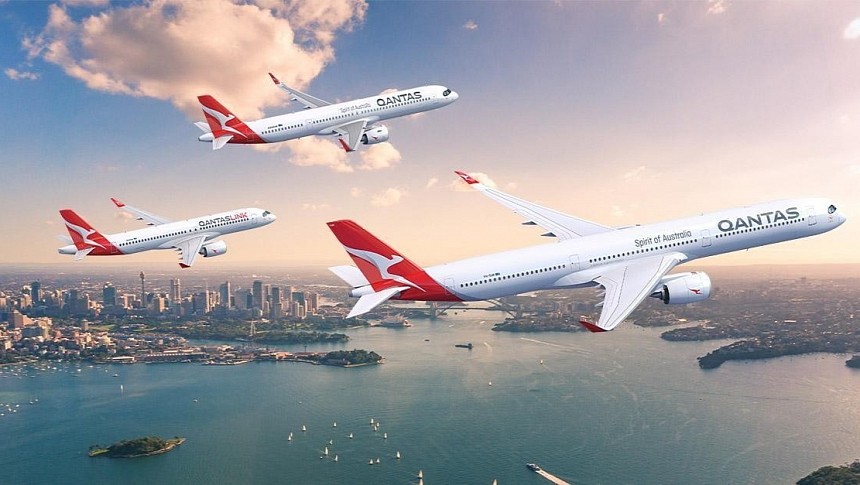Next-generation airliners are supposed to reduce emissions and demonstrate increased efficiency. What if they also integrated unprecedented features for passenger comfort? In preparation for the pioneering non-stop flights connecting Australia with Europe and the US, Qantas is also creating a truly unique customer experience based on science.
A time-saving flight that could get folks from Sydney to New York or London faster than ever sounds impressive. Still, the associated jetlag would be just as terrible as for conventional flights. Yet Qantas wants to do something no other airline has done before – match this pioneering performance with a unique in-flight experience.
This is much more than a luxurious cabin design. We're talking about a dedicated research project focusing on specific changes that can make things more pleasant for future passengers.
Qantas partnered with the University of Sydney's Charles Perkins Center for this customer-centered research. In 2019, a team of scientists was onboard three dedicated research flights, together with volunteer customers, in preparation for Project Sunrise, the world's longest non-stop flight.
They later used the data collected during these flights to come up with specific changes that could be implemented to reduce jetlag drastically.
The airline recently gave a glimpse into what this innovative in-flight experience would look like. A tailored menu would focus not on gourmet options but on foods with a specific effect on the brain.
More specifically, meals would be designed to support relaxation and sleep. Specific lighting features and schedules would also be integrated to help passengers adapt to the destination's time zone. Last but not least, passengers would be encouraged to do some stretching and fitness based on a tailored program.
The results sound great – even after a 20-hour flight, passengers could step off the plane feeling refreshed and energetic due to much better in-flight sleep and could function better for two days after the flight.
Airbus is supporting this innovative research by integrating dedicated features into the A350 cabin. The aircraft will reveal a cool Wellbeing Zone for the Premium Economy and Economy class, where folks get to move and stretch. All classes will benefit from extra room because the A350 cabin cuts the number of seats significantly – 100 less, compared to similar airliners.
The complex lighting system, with brightness and color levels that adapt to each phase of the flights, is also being devised together with Airbus. This year, the manufacturer will hold a combined lighting workshop at its facility in Hamburg, Germany, claiming to be an industry-first.
The first Airbus A350 dedicated to Project Sunrise is set to be delivered in 2025. Qantas is launching the revolutionary flight on the Sydney-New York route that year. Hopefully, it will be a unique experience in terms of comfort and performance – that's what a new era of commercial air travel should be all about.
This is much more than a luxurious cabin design. We're talking about a dedicated research project focusing on specific changes that can make things more pleasant for future passengers.
Qantas partnered with the University of Sydney's Charles Perkins Center for this customer-centered research. In 2019, a team of scientists was onboard three dedicated research flights, together with volunteer customers, in preparation for Project Sunrise, the world's longest non-stop flight.
They later used the data collected during these flights to come up with specific changes that could be implemented to reduce jetlag drastically.
The airline recently gave a glimpse into what this innovative in-flight experience would look like. A tailored menu would focus not on gourmet options but on foods with a specific effect on the brain.
More specifically, meals would be designed to support relaxation and sleep. Specific lighting features and schedules would also be integrated to help passengers adapt to the destination's time zone. Last but not least, passengers would be encouraged to do some stretching and fitness based on a tailored program.
The results sound great – even after a 20-hour flight, passengers could step off the plane feeling refreshed and energetic due to much better in-flight sleep and could function better for two days after the flight.
Airbus is supporting this innovative research by integrating dedicated features into the A350 cabin. The aircraft will reveal a cool Wellbeing Zone for the Premium Economy and Economy class, where folks get to move and stretch. All classes will benefit from extra room because the A350 cabin cuts the number of seats significantly – 100 less, compared to similar airliners.
The complex lighting system, with brightness and color levels that adapt to each phase of the flights, is also being devised together with Airbus. This year, the manufacturer will hold a combined lighting workshop at its facility in Hamburg, Germany, claiming to be an industry-first.
The first Airbus A350 dedicated to Project Sunrise is set to be delivered in 2025. Qantas is launching the revolutionary flight on the Sydney-New York route that year. Hopefully, it will be a unique experience in terms of comfort and performance – that's what a new era of commercial air travel should be all about.











